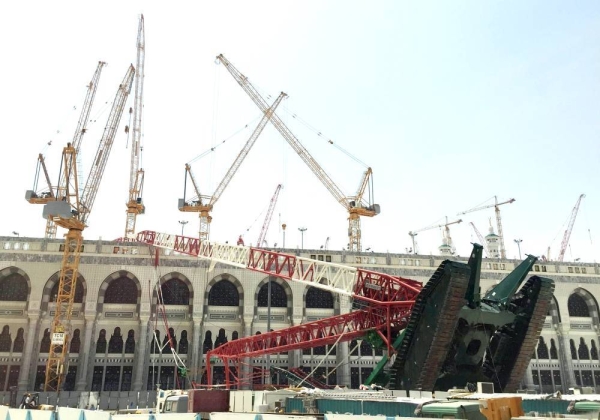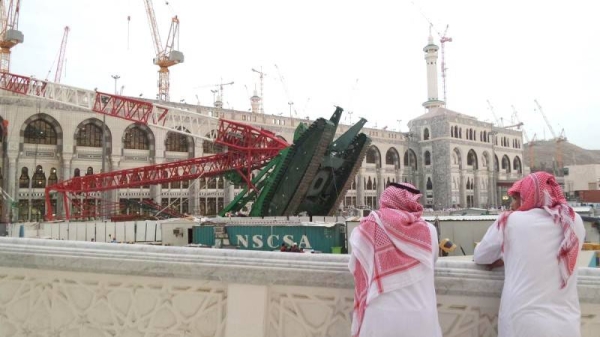
Saudi Arabia’s Supreme Court has upheld the verdict of the Makkah Criminal Court of Appeal issued in February this year to slap fines amounting to SR20 million on Saudi Binladin Group after conviction of its negligence and violation of safety rules in the Makkah Grand Mosque crane crash case.
Okaz/Saudi Gazette has learnt from well-informed sources that the court also convicted eight directors, heads of departments, executives, and engineers with awarding three years in prison and fines. It has acquitted three engineers and supervisors of the charges, and suspended the trial of another defendant following his death. The court also recommended that some entities to be placed under criminal liability due to their dereliction of duty.
The apex court closed the case permanently, while affirming that the ruling acquired the final status by rejecting the cassation request, and appending the ruling in the executive form, with the phrase “this ruling is final and binding.”
The Supreme Court’s final verdict came nearly eight years after the Haram crane accident, which claimed the lives of 110 people and injured of another 209 when a crane involved in the Haram expansion project crashed in the eastern courtyard of the Grand Mosque at 6:05 pm on Friday, Sept. 11, 2015. The crash also caused material damage to the Grand Mosque structure. The reason of the crash was initially attributed to downward winds with a speed of 80 km per hour.
The Public Prosecution framed the Binladin Group of charges of negligence, dereliction of duty, and the failure of safety officials and project managers to take the necessary precautions and caution in following up the weather conditions in accordance with the stages of alerts issued by the General Presidency of Meteorology and Environmental Protection.
The court also found guilty of the group in its failure to interact with the presidency officials with regard to precautionary measures that ensure the safety of the site and visitors to the Grand Mosque or reduce the risks and effects resulting from the accident while carrying out the construction works of the Grand Mosque Expansion.
While upholding the Criminal Court of Appeal’s verdict, the Supreme Court convicted the Saudi Binladin Group of violating the list of safety rules and means of protection that must be followed in construction sites, which included the necessity of applying the technical safety rules required to be observed for the safety of cranes.
In a previous verdict on Oct. 1, 2017, the Makkah Criminal Court had acquitted all 13 defendants who were charged with negligence. The Makkah court had also ruled that the disaster was caused by heavy rains and thunderstorms, rather than human error or fault.
Later, the Court of Appeal upheld on Aug. 4, 2021, the verdict of the Criminal Court to acquit all the defendants in the case. In December 2020, the Criminal Court issued its verdict for the third time, acquitting all 13 defendants in the case, including the Saudi Binladin Group. The court clarified then that it was found nothing new except what it had ruled earlier and that it will send a copy of the verdict to the Court of Appeal to decide what it deems fit.
Consequently, the First Circuit of the Supreme Court decided to overturn all the verdicts issued by the Criminal Court and the Court of Appeal in the crane crash case. It ordered that all the cases shall be reexamined by a new judicial circuit and that the circuit shall not include any one of the judges who had previously considered the case.
This resulted in the verdict of the Makkah Criminal Court of Appeal in February 2023. The court slapped fines amounting to SR20 million on Binladin Group and found seven defendants guilty of negligence and violation of safety rules. Three of these defendants were sentenced to six months in prison and fines amounting to SR30000 while four others were awarded three months in jail and SR15000 in fines.
The defendants approached the Supreme Court, challenging the verdict of the Appeal Court. In their petition for cassation of the verdict, Binladin Group and other defendants submitted memorandums in which they pleaded that the accident was caused by strong winds, and that all the safety measures were taken. The court examined hundreds of technical and engineering documents and reports, and the trials covered all stages of litigation










